
Noor Jehan was a Pakistani playback singer and actress who worked in both British India and later in Pakistan's cinema. Her career lasted over six decades, during which she recorded 10,000 songs. Jehan had proficiency in Hindustani classical music, as well as in other genres such as Punjabi and Sindhi. She made her directorial debut with the film Chann Wey in 1951, becoming the first female film director in Pakistan. She is recognized for her contributions to music in the Indian subcontinent, particularly in Pakistan. She was given the title of Malika-e-Tarannum in Pakistan.
Mirza Nazir Baig, best known by his screen name Nadeem , is a Pakistani actor, singer, and producer. He has appeared in over two hundred films during his 56-year-long career.He has also been honored with the Pride of Performance award in 1997. He has also won a record 16 Nigar Awards as an actor.
Jhoomer is a 1959 Pakistani film directed by Masood Parvez, producer by Khwaja Khurshid Anwar who wrote the screenplay also. The music composition was also done by Anwar and lyrics by Tanvir Naqvi. It stars Musarrat Nazir, Allauddin, Sudhir and Naeem Hashmi.
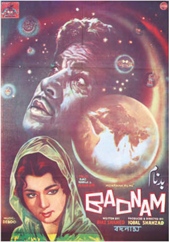
Badnaam is a Pakistani film in Urdu language, released on 2 September 1966, adapted from Saadat Hasan Manto's short story Jhumkay ("Ear-rings") by screenwriter Riaz Shahid, and was the second film adaptation of the Manto's story after 1946 Bollywood adaptation. The film was directed and produced by Iqbal Shehzad, in his debut as a film director. Badnaam's cast included Allauddin, Nabeela, Neelo, Ejaz Durrani, Diljeet Mirza, Hameed Wain, Rangeela and Zumurrud.
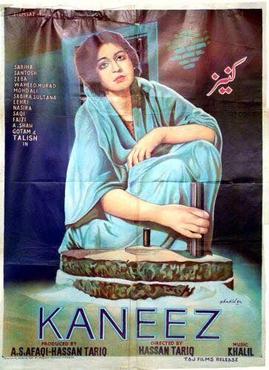
Kaneez is a 1965 Pakistani Urdu black-and-white film directed by Hassan Tariq and produced by Hassan Tariq and Ali Sufiyan Afaqi. Its cast had Waheed Murad, Zeba, Mohammad Ali, Sabiha Khanum, Lehri, Saqi, Adeeb and Talish. The film revolves around a family having high traditions.
Musarrat Nazir Khawaja is a Pakistani singer and film actress, who acted in many Urdu and Punjabi films. Many years later, she also sang solo, mostly wedding and folk songs.
Mukhra is a super-hit 1958 Pakistani Punjabi-language film. Many of its songs became very popular due to its superb music by Rasheed Attre.
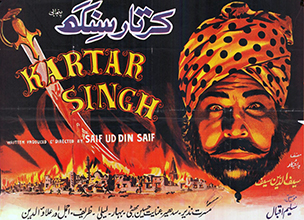
Kartar Singh is a 1959 Pakistani Punjabi-language film about the partition of India in 1947 and the widespread violence that accompanied it.
Sudhir was a Pakistani film actor, director and producer. He made his film debut in the 1947 movie Farz and continued to work in Pakistani cinema through the 1980s. In the course of his career, he became known as an action hero, and appeared in a total of 173 films.
M. Ashraf or Muhammad Ashraf was a Pakistani film composer.
Anwar Kamal Pasha, was the pioneer in the Pakistan film industry and an early Pakistani film director and producer from Lahore, Pakistan.
Zubaida Khanum was a Pakistani playback singer who recorded over 250 film songs during the Golden Age of Pakistani film music of the 1950s and 1960s. She was considered Pakistani equivalent to Marni Nixon of Hollywood for giving voice to featured actresses in movie musicals.
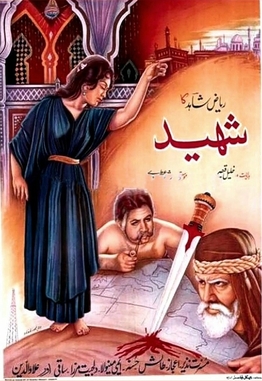
Shaheed is a 1962 Pakistani Urdu language music blockbuster classical film directed and produced by Khalil Qaiser under the production banner of K. K. Productions, and was a new banner that Qaiser formed.

Koel is a Pakistani 1959 musical romantic drama film directed by Masood Parvez. The film stars Noor Jehan with Aslam Pervaiz, Neelo and Allauddin in supporting roles.
Baghi is a 1956 Pakistani Urdu film directed by Ashfaq Malik. Sudhir, Musarrat Nazir, Allauddin, and Agha Talish were among the main cast. Inspired by the American film Apache (1954), it is considered as the first action film of Lollywood.
Behan Bhai is a 1968 Pakistani drama film directed by Hassan Tariq, who also wrote the screenplay.
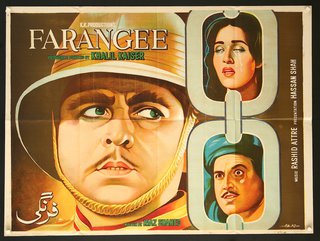
Farangi is a 1964 Pakistani Urdu film. It is directed by Khalil Qaiser and written by Riaz Shahid. It was the second film produced by Khalil Qaiser's newly formed K. K. Productions. The film stars Sudhir, Shamim Ara and Agha Talish with Bahar Begum and Allauddin.
Insan Badalta Hai is a 1961 Pakistani film produced by Waheed Murad in his debut production. It starred Darpan and Shamim Ara. The film was directed by Munawwar Rasheed.







